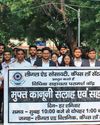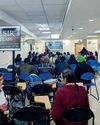
Q. When you founded the TDU, what was your main objective and vision for education?
A. In 1990, we felt that it is important to have an organised database of all medicinal plants so we started a new institute called Foundation for Revitalization of Local Health Tradition. It took us years to get it running and we finally managed to do so with the help of Danish government funding. The idea was to create a modern computerised database genetic pool in terms of modern chemistry. Then we started a hospital to treat patients with traditional medicines. We realised that there is a big vacuum here between traditional and modern practices.
Modern medicine does not believe in some of these [traditional] practices because we don't have enough data, experiments and proof. We felt that there is a need for transdisciplinary medicine where we take best of both practices and provide services to large populations in rural areas who have access to traditional medicine but don't have access to modern ones. The university came about as our effort to encourage transdisciplinary sciences.
We have leadership lessons in traditional wisdom as well as in modern business administration. Our idea is to merge the best of modern and traditional to create an integrated knowledge base.
Q. You served as chairman of the National Knowledge Commission. What impact did it have?
This story is from the {{IssueName}} edition of {{MagazineName}}.
Start your 7-day Magzter GOLD free trial to access thousands of curated premium stories, and 9,000+ magazines and newspapers.
Already a subscriber ? Sign In
This story is from the {{IssueName}} edition of {{MagazineName}}.
Start your 7-day Magzter GOLD free trial to access thousands of curated premium stories, and 9,000+ magazines and newspapers.
Already a subscriber? Sign In

Sleeper Cells: Law schools' 'dormant' legal aid clinics
A law college survey by the Supreme Court's policy centre found that a worrying number of legal aid clinics do little more than hold legal awareness camps, despite NALSA, BCI rules. This leaves gaps in legal education

Law's new niche frontiers
How niche law programmes are blending science with legal expertise, transforming legal education and creating specialised career paths

'GP Sir's classes' a ray of hope for the poor
Shrishti (name changed), 31, hails from the Valmiki community based in Gurdaspur, Punjab; she was born into a family of safai karamcharis - cleaners and at 21, married into another.

DU Law Faculty is part of CLAT 2025 but plans own exam: Dean
Delhi University's Faculty of Law will admit to its BBA LLB and BA LLB courses through the CLAT exam this year.

Studying law through films, novels, comics
Law schools are using various art forms - films, comics, theatre, puppetry

Legal education meets AI
As artificial intelligence reshapes industries, India’s leading law schools are introducing specialised courses and research initiatives, often in collaboration with technical institutions. But the need for comprehensive regulations persists

A LEGACY IN CRISIS
Asia's oldest law college and alma mater to legal luminaries, Government Law College, Mumbai, now grapples with declining standards, administrative apathy, and students' shifting educational aspirations

Law Colleges for 2025
Careers360 has ranked 100 law colleges and rated over 185 institutions, categorising them into distinct zones and states, for a comprehensive overview of legal education

IIT Madras introduces another quota
After admitting five students via the sports quota in 2024-25 - a first among the IITs Indian Institute of Technology Madras has now introduced another quota for \"fine arts and culture excellence\".

CLAT answer keys and court cases
Many Common Law Admission Test (CLAT) candidates claimed to find mistakes in its provisional and final answer keys.